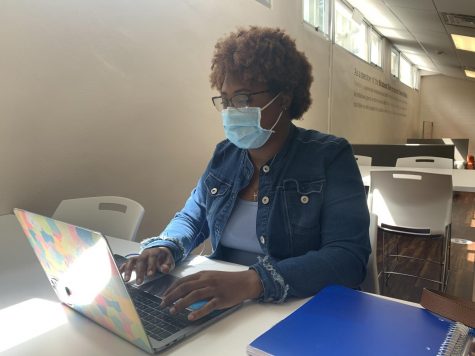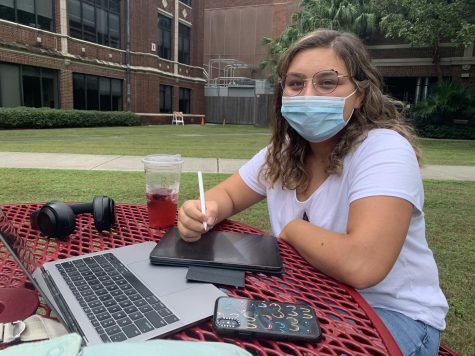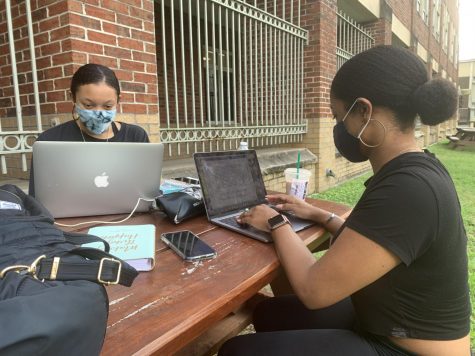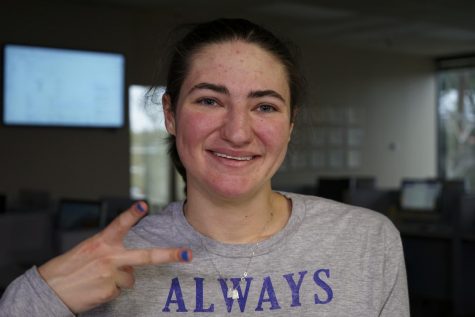Students react to online learning
October 4, 2020

Biology pre-med junior Sallie Fell loved meeting new people, talking to her professors and spending late nights in Monroe Library. When Loyola moved its classes online due to the coronavirus outbreak back in March, her college life turned upside down.
“All of those parts of my life vanished,” Fell said.
After months of remote learning, the university gave students a choice to continue pursuing their education either on campus or at home.
According to an email from Maria Calzada, dean of the College of Arts and Sciences, nearly 65% of courses for this semester are either in-person or HyFlex, or hybrid, while 30% of them are online. Online courses are either synchronous or asynchronous.
Biological science junior Susan Thomassie said that asynchronous courses are helpful since she’s a commuter.
“Some of my classes being online means I spend less time driving to and from campus, which means more study time, which I really appreciate,” Thomassie said.
Fell liked how her online courses offer more flexibility.
“I could watch lectures on my own time,” Fell said.
Students turn in their assignments on Canvas, a course management system that the university switched to last summer. Professors can also post lectures and assignments for students to complete online.
Dario Bayardo, accessibility counselor and counseling graduate, said that he enjoys getting to learn about a new learning system and that during his 10 years of college, Blackboard, a system that the university previously used, “felt old.”
“Getting Canvas is a nice refresh,” Bayardo said.
According to Esme Robert, online success coach, online learning helps students plan their courses according to their schedules, accommodating those who live off-campus and go to work.
“It’s really, you know, supporting the student kind of in a holistic way,” Robert said.

However, there were barriers that students faced in online learning.
Learning technologies developer Jim Dugan said that while it’s usually easy to design an online course that’s structured and efficient, it might not work for every class. For example, courses that require students to work in a laboratory or play an instrument can be impossible to implement online.
“It can be to a degree, but some things are going to be lost, and there’s really not placement of face-to-face contact in some of those kinds of circumstances,” Dugan said.
Online learning can make it harder to understand what’s going on in class, not to mention easier to get distracted by your surroundings, according to Thomassie.
When Fell had to adjust to online learning back in March, she tried to maintain structure in her life by designating times for studying and times for leisure.
“It felt like I had lost all of the organization in my collegiate life when everything went online,” Fell said.
One of the biggest challenges Fell faced was practicing self-discipline.
“I was attending college classes in my bedroom, surrounded by distractions,” Fell said.
Thomassie said that it’s harder to keep in touch with her professors. She said that office hours via Zoom aren’t the same as in person because she can’t write things out.
“I really need help, and it really helps to have someone in front of you showing you what to do,” Thomassie said.
Some professors are also struggling with online learning. According to Fell, her professors didn’t receive enough training on Zoom.
“This upsets me because I see them trying so hard to adapt to this new way of teaching,” Fell said.
Canvas also had its ups and downs. Bayardo said he struggled with navigating through Canvas. For instance, he couldn’t find his reading assignments in the ‘Files’ section for a class and later found out they were under the ‘Modules’ section.
“I like to have my reading done on the weekends so that when I’m in class during the week, I’m not worried about reading,” Bayardo said. “I felt like I kind of had to rush because I couldn’t find it.”
In order to stay on top of her classes, Fell checks her emails and Canvas “religiously.”
“I always feel like there is some hidden assignment that I forgot to do,” Fell said.
It’s also easy for students to feel “lonely and disconnected” online, which is why it’s important to keep them engaged and provide them with the tools to help them succeed, according to online student success coordinator Corina Todoran.
“We have to make sure that they feel that they’re a part of our community,” Todoran said.
Despite the undersides of online learning, Bayardo thinks that it’s changed people’s approach to education.
“I do think online learning is kind of opening everyone’s eyes to some of the things that we do from tradition that aren’t necessarily helpful and kind of learning from that and being able to say, ‘Let’s make changes so that, let’s adapt, so that we can all grow and continue to do our best,” Bayardo said.







